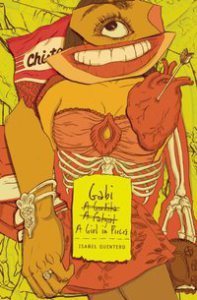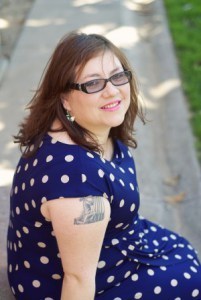International Women’s Week: Guest Post from Isabel Quintero: Choosing Without Fear
“Critical consciousness, they say, is anarchic. Others add that critical consciousness may lead to disorder. Some, however, confess: Why deny it? I was afraid of freedom. I am no longer afraid!” -Paulo Freire

Cinco Puntos Press, October 2014.
Many women, young and old, cis and not, straight or not, have at one point or another found themselves in a battle between being labeled good and bad. Or maybe I am being presumptuous; maybe there are women out there who have had the ovaries for ever and ever to ignore those labels and just exist. Though, such was not the case with me.
In GABI, A GIRL IN PIECES, being “good” or being “bad” is constantly on Gabi’s mind. Goodness has been defined by her mother, and other adults in her world, as: staying a virgin (until getting married), having faith in a Christian God, never questioning adults, staying at home (until getting married), being thin, getting good grades, and getting married. But these expectations are only imposed on girls and not on boys. Which is a big problem.
The thing with Gabi is that she doesn’t want to stay a virgin, she questions her faith and adults, she questions (gasp!) her culture, she wants to go away for college, she’s fat, she gets decent (but not perfect) grades, and marriage is the farthest thing from mind. Her wants and needs are contradictory to the expectations that have been set for her and this makes her question her goodness, and in some aspects, her worth. Her journey towards self-discovery is marked by her rejection of many of the expectations that are placed on her. This doesn’t mean that she is a completely self-aware human being, she is only 17 after all, but it does mean that she begins to question who she wants to be, as opposed to simply accepting who her mother, and other adults in her life, tell her she is or should be.
So then what happens to girls who go against the expectations? Are they bad?
The obvious answer is, no. However, there are ramifications that come with choosing what kind of woman you’d like to be. Because really, that is all being good or bad boils down to: choice. Choice in what we do with our bodies. Choice in what kind of education we seek. Choice in what careers we have. Choice in our marriage or relationship status. There is a fear in giving women the ability to choose and dictate what kind of lives they will have for themselves. Part of the fear, I believe, may be that if women have complete control over their choices, then what does that mean to the hegemonic patriarchy which has defined womanhood and femininity for so long? That type of power shift is definitely something to be feared. What would that mean to capitalist endeavors whose revenue subsists on fabricating the image of “real” or “normal” women? What would that mean to politics? And this fear is not only felt by those who set up the standards or the accepted choices, but also by women doing the choosing because we’ve been raised to adhere to those definitions and one false choice (staying single, not having children, having an abortion, leaving home before you’re married, staying fat, being too thin/too loud/too masculine/feminine) and you’re a slut/whore/bad girl/unfit mother/bad wife/bitch/emasculator; anything but a “real” woman.
As a woman of color, a Mexican American/Latina/Chicana (I couldn’t decide on the label I wanted for this, so I just threw them all on), we have the added pressure of navigating through stereotypes and cultural expectations that don’t jive well with our bicultural experience. For example, I was not allowed to leave home after high school and go away to college because my mom assumed that I would have sex. Take a moment to process that. The fear of her daughter losing her virginity was a much stronger pull for my mother, than the possibility of me gaining independence and experiences that only living on a university campus could afford. I could have left home, of course. But being raised in an environment where to do that would have put in to question my goodness and would have made me a bad girl, I didn’t see leaving as an option. So, I stayed home and was labeled bad anyway for having sex before marriage.
With GABI I really wanted to talk about all those fears I had as a teenager, and all the questions I had about what it meant to be a woman (spoiler alert: there is no one way). I wanted young women to know that they were not alone in their questioning of the status quo, of the people who say “boys will be boys,” and that they were not alone in their feelings about their bodies and whom they should belong to (ourselves, of course). In addition to that, for Latina/Mexican American/Chicana young women, I wanted to present a different narrative in which this experience, our experience (or one of them at least) was front and center, and not marginalized or relegated to stereotypes or tropes.
Now, I think I am less afraid of being bad, and more afraid of being constrained or untrue to myself, and about playing a part for the rest of my days because I was too afraid to say what I really felt or really thought, or to make choices that made me happy versus choices that were expected and accepted. Freedom is scary, but oppression, especially self-imposed, is a lot more frightening.

Isabel Quintero.
Isabel Quintero is a writer and adjunct faculty instructor who resides in Southern California’s Inland Empire with her husband. She is the daughter of Mexican immigrants who made that journey for a better life many, many years ago. She got her love of words from her mother and her love of chorizo asado from her father. She has one brother with whom she likes to exchange cute and funny animal pictures. In addition to writing fiction, Isabel also writes poetry, and is on the board for a non-profit literary arts organization, PoetrIE. GABI, A GIRL IN PIECES from Cinco Puntos Press, is the winner of the 2015 William C. Morris Award for Debut YA Novel, and the 2015 Tomas Rivera Mexican American Children’s Book Award. It is her first novel. She is very excited about that. Tweet Isabel at @isabelinpieces








